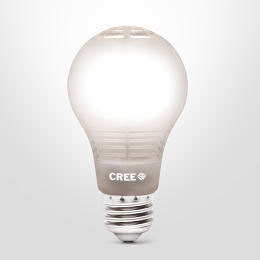Besides Tesla, only one cleantech company made it onto Fast Company‘s 50 Most Innovative Companies list for this year, and that’s Cree.
Based in Durham, North Carolina, Cree (Nasdaq: CREE) makes the most popular LED light bulbs in the US, successfully morphing from a components manufacturer, where its products had to compete as commodities.
MIT Technology Review honored Cree last year as one of the "50 Smartest Companies" because of its transformational leadership in the lighting industry. "Guided by a culture that thrives on relentless innovation, Cree changed the consumer lighting market with the introduction of the Cree® LED Bulb, which works as well or better than traditional incandescent bulbs at a price that gives people a reason to switch to LEDs." Tesla, Brightsource Energy, Hanergy Holding and 1366 Technology (solar) are also on the list.

Fast Company says:
Since its founding in 1987, the company had staked out a successful but obscure business building chips and high-tech components that go inside other companies’ LED products, the superefficient, long-lasting bulbs that have sparked a revolution in the lighting business. But a few years ago Cree decided it could make a better bulb itself. So it did. In secret. The company handpicked an internal team and put them in a secure and private location. And that team in turn created an LED design that quickly won over Home Depot, which decided to showcase the brand to customers. Two years and 20 million bulbs later, Cree is the best-selling LED light in the U.S.
It’s exceedingly rare for a company to jump from an enterprise to a consumer business so fast – and with such spectacular results. One reason for Cree’s rapid ascent is its technical control over every aspect of an LED bulb, a product that demands tremendous expertise in material science, global-scale manufacturing, and electronics.
By quickly tweaking various components, Cree could achieve breakthroughs on the bulbs’ cost and performance that its competitors could not. Also, the company could be sure it would not be distracted by other marketing pursuits: Cree has staked its entire research and development efforts on the ascent of the LED. "We have no other technologies," explains Mike Watson, VP of product strategy. "We now have full vertical capabilities of changing anything and everything in a light bulb, and no one else has that capability."
In the coming decade, as the consumer market – along with the much larger industrial and commercial lighting markets -transitions from fluorescent and incandescent lights to LEDs, Cree sees vast potential for growth. "There are 5 billion A-type bulbs in the US," says Watson, referring to the most common bulb in a lamp or fixture. "And the market is now at about 2% penetration. So there’s a long way to go."
As part of President Obama’s Better Buildings program, his new "Presidential Challenge for Outdoor Lighting" has a goal of 1.5 million efficient light poles by mid-2016. The Department of Energy will help towns and cities adopt LEDs and motion-sensors for buildings, streetlights and highway lights, cutting in half the $10 billion they spend each year – the power consumed by 6 million homes. Less than 5% of outdoor fixtures currently have LED bulbs.
A new company, Generate Capital, recently formed to finance transitions to efficient technologies.
Read our article, North Carolina Hosts Obama’s First Innovation Hub.
Here is Fast Company’s list:

I just redid all the lighting in my house with Earthled.com and I am so happy, I found very good deals and very interesting products like a LED light that can be controlled by your phone! http://www.earthled.com/produc…
It’s definitely a good alternative to save electric power!
very interesting! I also like TOP-MAX brand bulbs.
https://www.facebook.com/topmaxled